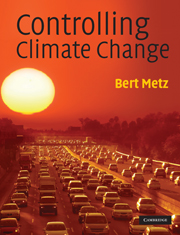Book contents
- Frontmatter
- Contents
- Preface
- 1 Climate change and its impacts: a short summary
- 2 Greenhouse gas emissions
- 3 Keeping climate change within sustainable limits: where to draw the line?
- 4 Development first
- 5 Energy Supply
- 6 Transportation
- 7 Buildings
- 8 Industry and waste management
- 9 Land use, agriculture, and forestry
- 10 How does it fit together?
- 11 Policies and measures
- 12 International climate change agreements
- Index
- Plate section
6 - Transportation
Published online by Cambridge University Press: 05 June 2012
- Frontmatter
- Contents
- Preface
- 1 Climate change and its impacts: a short summary
- 2 Greenhouse gas emissions
- 3 Keeping climate change within sustainable limits: where to draw the line?
- 4 Development first
- 5 Energy Supply
- 6 Transportation
- 7 Buildings
- 8 Industry and waste management
- 9 Land use, agriculture, and forestry
- 10 How does it fit together?
- 11 Policies and measures
- 12 International climate change agreements
- Index
- Plate section
Summary
What is covered in this chapter?
Managing CO2 emissions from transportation cannot be separated from managing congestion, air pollution, and oil imports. All of these problems emerge from the ever increasing transportation needs. The solutions overlap to a great extent. Understanding the drivers and the trends is a must. In terms of strategies to address the issues there is a hierarchy: reduce demand, shift transport modes, improve efficiency, and change the fuel. Policy intervention is needed to realize the many good options to drastically reduce congestion, air pollution, oil consumption, and CO2 emissions.
Need for transportation
Mobility is an essential human need. Social relations and earning an income require transportation. Industrialization and specialization have created the need for shipments of large amounts of goods over short and long distances. Globalization of the economy has strongly accelerated this. Transportation of people and goods therefore is crucial for economic and social development.
In the year 2000 average transport per person ranged from 1700 km in Africa to 21 500 km in North America, reflecting the strong influence of income. About half the total passenger-kilometres was covered by cars, of course with huge differences between countries. The share of the different transport modes (so-called modal split) in cities varies a lot.Figure 6.1 shows the large share of public transport and walking/cycling in cities in areas other than North America and Oceania.
- Type
- Chapter
- Information
- Controlling Climate Change , pp. 151 - 180Publisher: Cambridge University PressPrint publication year: 2009



